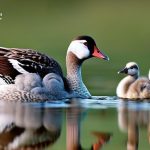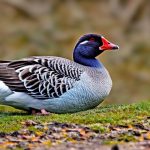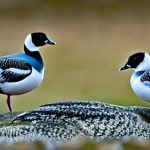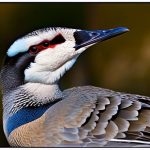The presence of geese near water can be a nuisance for many communities. These birds are attracted to water sources such as ponds, lakes, and rivers, and their presence can lead to issues such as noise, droppings, and damage to property. It is important for communities to find effective solutions to deter geese from these areas in order to maintain a clean and peaceful environment. This article will explore various methods that can be used to effectively deter geese near water.
Key Takeaways
- Geese are attracted to water and will often congregate near it.
- Physical barriers such as fences or netting can be effective in deterring geese.
- Decoys that resemble predators or other geese can scare off geese.
- Motion-activated sprinklers can startle geese and discourage them from staying in an area.
- Planting vegetation that geese dislike, such as tall grasses or prickly bushes, can make an area less appealing to geese.
Understanding the behavior of geese near water
Geese are naturally attracted to water sources because they provide them with food, shelter, and a place to rest. They are social animals and often gather in large groups near water. Geese are also territorial creatures and will defend their nesting sites aggressively. Understanding their behavior is crucial in order to effectively deter them from certain areas.
When geese are near water, they tend to graze on grass and other vegetation, leaving behind droppings that can be unsightly and unsanitary. They also have a tendency to become aggressive towards humans and other animals if they feel threatened or if their nesting sites are disturbed. By understanding these behaviors, communities can implement strategies that will discourage geese from congregating near water sources.
Implementing physical barriers to deter geese
One effective method of deterring geese from certain areas is the use of physical barriers. Fences, netting, and hedges can be installed around ponds or other bodies of water to prevent geese from accessing these areas. These barriers create a physical obstacle that makes it difficult for geese to enter or exit the water.
Fences can be made from materials such as wire or plastic and should be at least three feet high to prevent geese from flying over them. Netting can be placed over the surface of the water to prevent geese from landing or swimming in it. Hedges can be planted around the perimeter of the water source to create a natural barrier that geese are less likely to cross.
Using decoys to scare off geese
Another method of deterring geese from water sources is the use of decoys. Decoys are objects that resemble predators or other animals that geese are afraid of. These decoys can be placed near the water to scare off geese and discourage them from congregating in the area.
Decoys can be made to resemble animals such as foxes, coyotes, or even other birds of prey. They can be made from materials such as plastic or rubber and should be placed strategically around the water source. The presence of these decoys will create a sense of danger for the geese and make them less likely to stay in the area.
Installing motion-activated sprinklers
Motion-activated sprinklers are another effective method of deterring geese from water sources. These sprinklers are equipped with sensors that detect movement and automatically spray water when triggered. When geese approach the water, the motion-activated sprinklers will activate and spray water, scaring them away.
The sudden burst of water from the sprinklers startles the geese and makes them associate the water source with a negative experience. Over time, they will learn to avoid the area altogether. Motion-activated sprinklers can be installed around the perimeter of the water source or strategically placed in areas where geese tend to congregate.
Planting vegetation that geese dislike

Certain types of vegetation can also be used to deter geese from water sources. Geese prefer open areas with short grass where they can easily spot predators. By planting tall grasses or thorny bushes around the perimeter of the water source, communities can create an environment that is less attractive to geese.
Tall grasses provide cover for potential predators and make it difficult for geese to see approaching danger. Thorny bushes create a physical barrier that geese are less likely to cross. By planting these types of vegetation, communities can effectively deter geese from congregating near water sources.
Applying non-toxic repellents
Non-toxic repellents can also be used to deter geese from water sources. These repellents are made from natural substances such as grape extract or peppermint oil and create an unpleasant scent or taste that geese dislike. They can be sprayed on the grass or vegetation around the water source to discourage geese from grazing in the area.
Non-toxic repellents are safe for the environment and do not harm the geese or other animals. They provide a long-lasting solution to deter geese and can be reapplied as needed. By using non-toxic repellents, communities can effectively discourage geese from congregating near water sources.
Consistently removing food sources
One important aspect of deterring geese from water sources is consistently removing food sources. Geese are attracted to areas where they can find an abundance of food, such as garbage or birdseed. By regularly cleaning up these food sources, communities can make the area less attractive to geese.
Garbage cans should be securely closed and bird feeders should be placed in areas where geese cannot access them. By removing these food sources, communities can discourage geese from staying in the area and prevent them from causing damage or leaving droppings.
Encouraging natural predators in the area
Another effective method of deterring geese from water sources is by encouraging natural predators in the area. Predators such as foxes or coyotes are natural enemies of geese and their presence can help keep geese away from certain areas.
Communities can create habitats for these predators by providing suitable shelter and food sources. This can include planting native vegetation that attracts small mammals or leaving areas of the landscape undisturbed. By encouraging natural predators, communities can maintain a balance in the ecosystem and effectively deter geese from water sources.
Educating neighbors and community members
In order to effectively deter geese from water sources, it is important to educate neighbors and community members about the problem. Many people may not be aware of the issues caused by geese near water or the methods that can be used to deter them.
By educating others about the problem, communities can gain support and cooperation in implementing solutions. This can include distributing informational brochures, organizing community meetings, or posting signs near water sources. By raising awareness, communities can work together to effectively deter geese and maintain a clean and peaceful environment.
Seeking professional help if necessary
If other solutions are not effective in deterring geese from water sources, it may be necessary to seek professional help. There are companies that specialize in wildlife management and can provide more specialized and effective solutions.
These professionals can assess the situation and recommend the best course of action. They may use methods such as habitat modification, harassment techniques, or even relocation of the geese. By seeking professional help, communities can ensure that they are using the most effective methods to deter geese from water sources.
In conclusion, understanding and effectively deterring geese near water is crucial for maintaining a clean and peaceful environment. By implementing physical barriers, using decoys, installing motion-activated sprinklers, planting vegetation that geese dislike, applying non-toxic repellents, consistently removing food sources, encouraging natural predators, educating neighbors and community members, and seeking professional help if necessary, communities can successfully deter geese from water sources. It is important for communities to take action and implement these solutions in order to maintain a harmonious coexistence with wildlife.
If you’re looking for effective ways to keep geese off your waterfront property, you might find this article on Poultry Wizard quite helpful. It provides valuable insights and tips on how to deter geese from invading your property and causing damage. From understanding their behavior to implementing various deterrent methods, this article offers practical solutions to protect your waterfront area. For more information, check out the article here.
FAQs
What are the common problems caused by geese on waterfront property?
Geese can cause damage to lawns, gardens, and crops. They can also leave behind droppings that can be unsightly and unsanitary. In addition, geese can be aggressive towards humans and pets, making it difficult to enjoy waterfront activities.
What are some effective ways to keep geese off waterfront property?
Some effective ways to keep geese off waterfront property include using decoys, installing fencing or netting, using noise deterrents, and planting vegetation that geese do not like.
Are there any humane methods to keep geese away?
Yes, there are humane methods to keep geese away. These include using visual deterrents such as reflective tape or balloons, using noise deterrents such as air horns or whistles, and using motion-activated sprinklers.
Is it legal to harm or kill geese?
In most cases, it is illegal to harm or kill geese. Geese are protected under federal and state laws, and there are strict regulations in place to ensure their safety and well-being.
What should I do if I encounter an aggressive goose?
If you encounter an aggressive goose, it is important to stay calm and avoid making sudden movements. Do not approach the goose or attempt to feed it. If the goose continues to be aggressive, slowly back away and seek shelter. If you are attacked by a goose, seek medical attention immediately.
Meet Walter, the feathered-friend fanatic of Florida! Nestled in the sunshine state, Walter struts through life with his feathered companions, clucking his way to happiness. With a coop that’s fancier than a five-star hotel, he’s the Don Juan of the chicken world. When he’s not teaching his hens to do the cha-cha, you’ll find him in a heated debate with his prized rooster, Sir Clucks-a-Lot. Walter’s poultry passion is no yolk; he’s the sunny-side-up guy you never knew you needed in your flock of friends!







